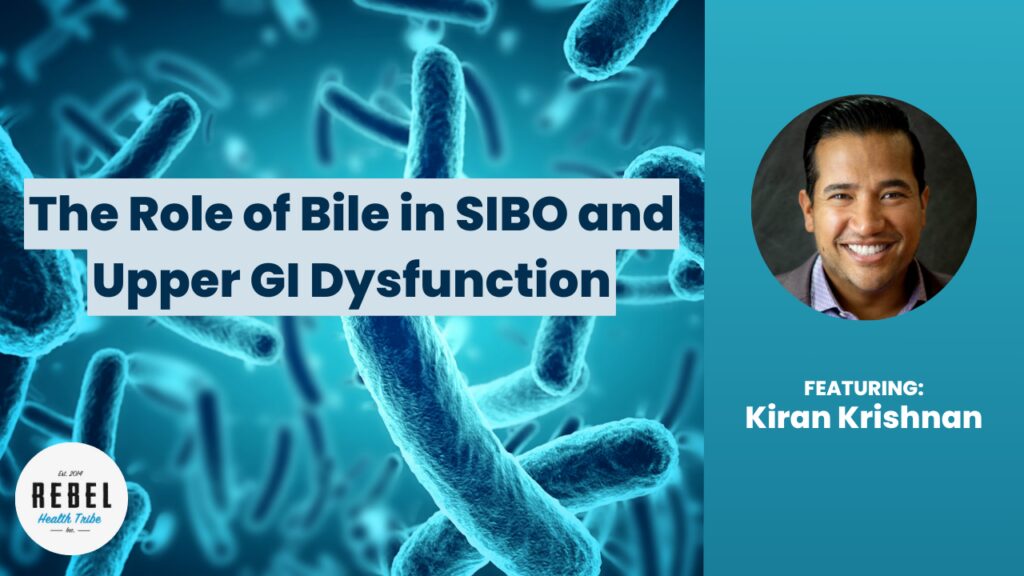The Role of Bile in SIBO and Upper GI Dysfunction

SHARE THIS EPISODE
Recent Videos
Webinar Transcript
Kiran Krishnan:
In the meantime, let me just mention bile again. And I talked about how important bile is. Again, it’s made in the liver, stored in the gallbladder, released. And it can be recycled about upwards of 15 times, through the digestive process. And bile acids are so important, because of course, they also enhance the absorption of fat soluble nutrients. They detoxify the body from fat soluble toxins, and then of course, they upregulate the nuclear FXR receptor at the end of the small intestine in the ileum, which then promotes the release of antimicrobials from the intestinal epithelium. So the barrier cells themselves, are releasing antimicrobials into the lumen, to prevent bacteria from growing in that space.
Now also, some of the primary bile salts, which are found in bile acids, have been shown to promote the germination of C. Difficle spores. And some of it, the secondary bile salts, will actually inhibit the germination. So what’s so interesting about this process, is if you have C. Diff as an opportunistic organism sitting in the very beginning of your small… Of your large intestine, it can actually be promoted to grow, if primary bile acids enter into the large intestine at higher amounts, right? Because remember, primary bile acids are supposed to get reabsorbed at the end of the small intestine, and not enter into the large intestine. But about 5% of that primary bile acid is actually converted to secondary bile salts, by microbes in those small intestine. Those secondary bile salts will enter into the large intestine, and those will actually inhibit the germination of C. Diff spores, right?
So what’s interesting about this, when you think about C. Diff and how common that infection is and how it’s associated with taking antibiotics, a big driver here could be, you take an antibiotic, it kills off the small intestinal bacteria whose job it is to convert primary bile acids to secondary bile acids at the very terminal end of the intestine. And if that vector is not there, or at lowest levels, you’re going to get more and more primary bile acids moving into the large intestine, where it will actually promote the germination of C. Diff, hence you start getting an overgrowth and opportunistic infection with C. Diff. So it’s so interesting to see, that if you disrupt one or two simple things, it can be a lifelong of medical conditions that you’re dealing with, right?
So decreasing the level of bile acids in the gut, favor gram negative bacteria. So keep that in mind, right? Bile acids being an antimicrobial, it works really well in terms of inhibiting bacterial growth. It, in fact, even works better on gram negative bacteria. Because remember, gram negative bacteria only have a lipid bilayer. They don’t have that firm cell wall structure around them. And the lipid layers are fatty acid layers, right? And so when you have bile, the bile will actually conjugate with the fatty acid layers that are in the cell membrane, and really disrupt the growth and functioning of gram negative bacteria. So if you see bile decreasing your bile flow or your bile acid pool, that gives more opportunity for gram negative bacteria, which are the dysbiotic types of bacteria, to grow in your small intestine.

Kiran Krishnan
About our Guest
Kiran Krishnan is a Research Microbiologist and has been involved in the dietary supplement and nutrition market for the past 17 years. He comes from a strict research background having spent several years with hands-on R&D in the fields of molecular medicine and microbiology at the University of Iowa. He left University research to take a position as the U.S. Business Development and Product Development lead for Amano Enzyme, USA. Amano is one of the world’s largest suppliers of therapeutic enzymes used in the dietary supplement and pharmaceutical industries in North America. Kiran also established a Clinical Research Organization where he designed and conducted dozens of human clinical trials in human nutrition.
Kiran is also a co-founder and partner in Nu Science Trading, LLC.; a nutritional technology development, research and marketing company in the U.S. Dietary Supplement and Medical Food markets. Most recently, Kiran is acting as the Chief Scientific Officer at Physician’s Exclusive, LLC. and Microbiome Labs. He has developed over 50 private label nutritional products for small to large brands in the global market. He is a frequent lecturer on the Human Microbiome at Medical and Nutrition Conferences. He conducts the popular monthly Microbiome Series Webinars through the Rebel Health Tribe Group practitioner training program, is an expert guest on National Radio and Satellite radio and has been a guest speaker on several Health Summits as a microbiome expert. He is currently involved in 9 novel human clinical trials on probiotics and the human microbiome.
Kiran is also on the Scientific Advisory Board for 5 other companies in the industry. Kiran offers his extensive knowledge and practical application of the latest science on the human microbiome as it relates to health and wellness.


